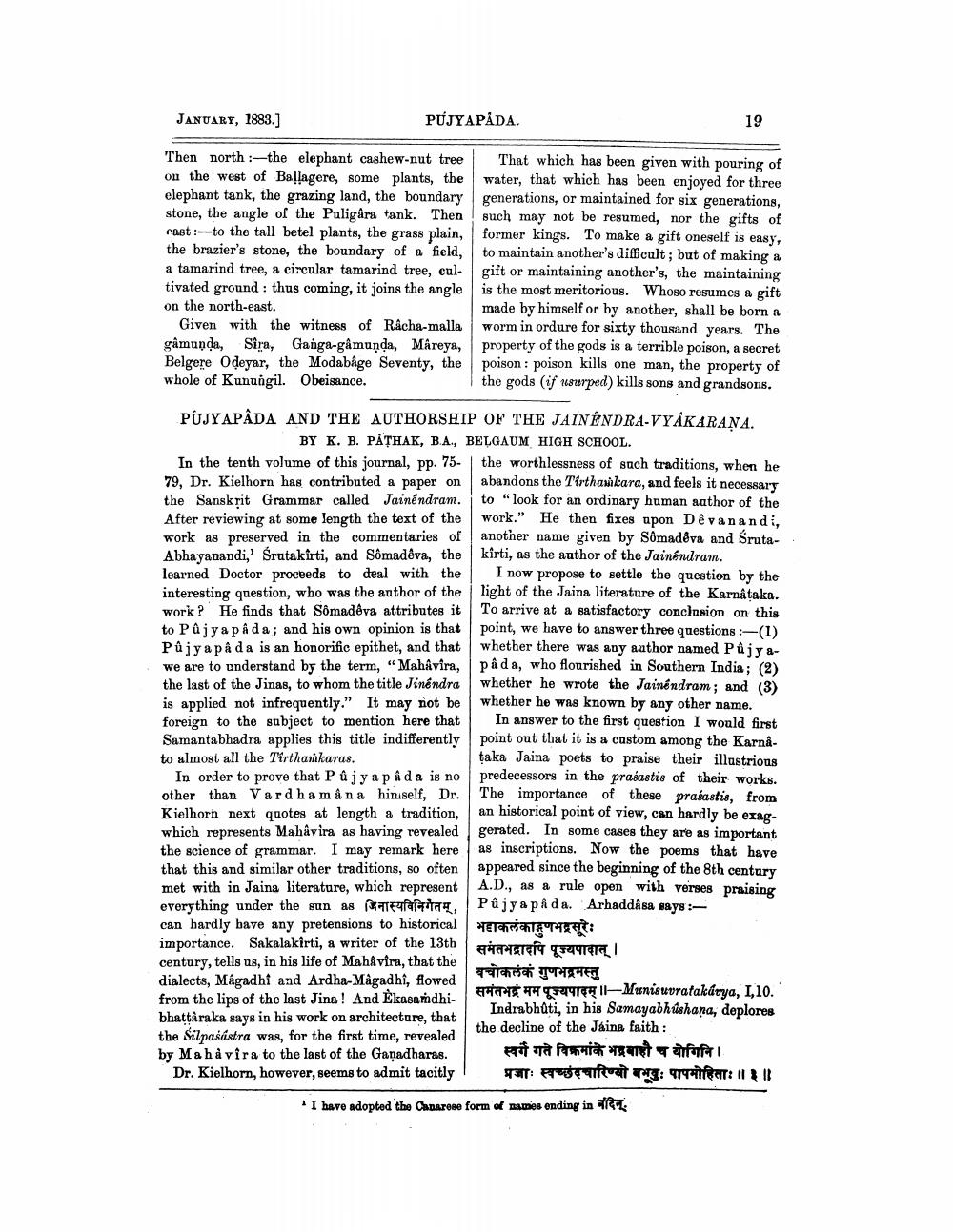________________
JANUARY, 1883.)
PUJYAPÅDA.
19
Then north :the elephant cashew-nut tree on the west of Ballagere, some plants, the elephant tank, the grazing land, the boundary stone, the angle of the Puligára tank. Then Past :-to the tall betel plants, the grass plain, the brazier's stone, the boundary of a field, a tamarind tree, a circular tamarind tree, cul. tivated ground : thus coming, it joins the angle on the north-east.
Given with the witness of Racha-malla gámunda, Sira, Ganga-gámunda, Máreya, Belgere Odeyar, the Modabåge Seventy, the whole of Kunungil. Obeisance.
That which has been given with pouring of water, that which has been enjoyed for three generations, or maintained for six generations, such may not be resumed, nor the gifts of former kings. To make a gift oneself is easy, to maintain another's difficult; but of making a gift or maintaining another's, the maintaining is the most meritorious. Whoso resumes a gift made by himself or by another, shall be born a worm in ordure for sixty thousand years. The property of the gods is a terrible poison, a secret poison : poison kills one man, the property of the gods (if usurped) kills sons and grandsons.
PUJYAPADA AND THE AUTHORSHIP OF THE JAINÊNDRA-VYÅKARANA.
BY K. B. PÅTHAK, B.A., BELGAUM HIGH SCHOOL In the tenth volume of this journal, pp. 75- the worthlessness of such traditions, when he 79, Dr. Kielhorn has contributed a paper on abandons the Tirthaikara, and feels it necessary the Sanskrit Grammar called Jainéndram. i to "look for an ordinary human author of the After reviewing at some length the text of the work." He then fixes upon Dê vanandi, work as preserved in the commentaries of another name given by Sômadêva and SrutaAbhayanandi,' Srutakirti, and Sômaddva, the kirti, as the author of the Jainandram. learned Doctor proceeds to deal with the 1 I now propose to settle the question by the interesting question, who was the author of the light of the Jaina literature of the Karnataka. work? He finds that Somadova attributes it To arrive at a satisfactory conclusion on this to Pujya pada; and his own opinion is that point, we have to answer three questions :-(1) Pujya på da is an honorific epithet, and that whether there was any author named Půjyawe are to understand by the term, "Mahavira, pâda, who flourished in Southern India; (2) the last of the Jinas, to whom the title Jinéndra whether he wrote the Jainéndram; and (3) is applied not infrequently." It may not be whether he was known by any other name. foreign to the subject to mention here that In answer to the first question I would first Samantabhadra applies this title indifferently point out that it is a custom among the Karnato almost all the Tirthanikaras.
taka Jaina poets to praise their illustrious In order to prove that P û jy ap ada is no predecessors in the prasastis of their works. other than Vardhamana hintself, Dr. The importance of these prasastis, from Kielhorn next quotes at length a tradition, an historical point of view, can bardly be exagwhich represents Mahavira as having revealed gerated. In some cases they are as important the science of grammar. I may remark here as inscriptions. Now the poems that have that this and similar other traditions, so often appeared since the beginning of the 8th century met with in Jaina literature, which represent A.D., as a rule open with verses praising everything under the sun as far frata Půjya på da. Arhaddasa says: can hardly bave any pretensions to historical importance. Sakalakirti, a writer of the 13th
समंतभद्रादपि पूज्यपादात् ।। century, tells us, in his life of Mahavira, that the
वचोकलंकं गुणभद्रमस्तु dialects, Magadhi and Ardha-Magadhi, flowed
HITTE THAT I--Munisuvratakávya, 1, 10. from the lips of the last Jina! And Ekasardhi.
Indrabhūti, in his Samayabhúshana, deplores bhattaraka says in his work on architecture, that
the decline of the Jaina faith : the Silpasástra was, for the first time, revealed by Mahåvira to the last of the Ganadharas.
स्वर्ग गते विक्रमांके भद्रबाहीच योगिनि । Dr. Kielhorn, however, seems to admit tacitly प्रजाः स्वच्छंदचारिण्यो बभूवुः पापमोहिताः॥३॥
I havo adopted the Canarese form of mannes ending in a




